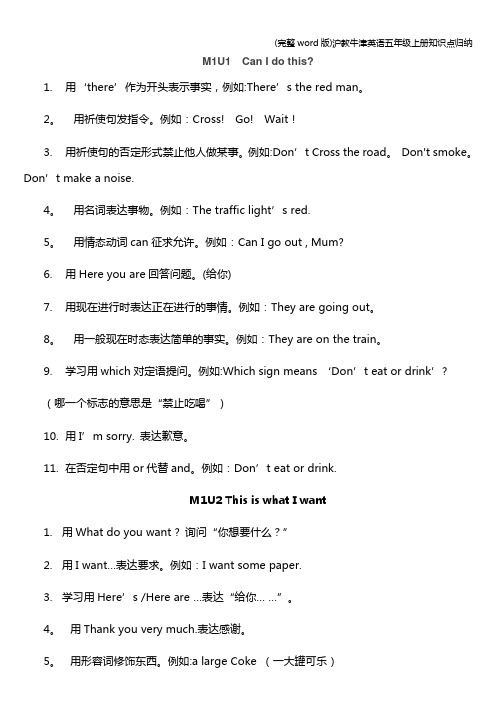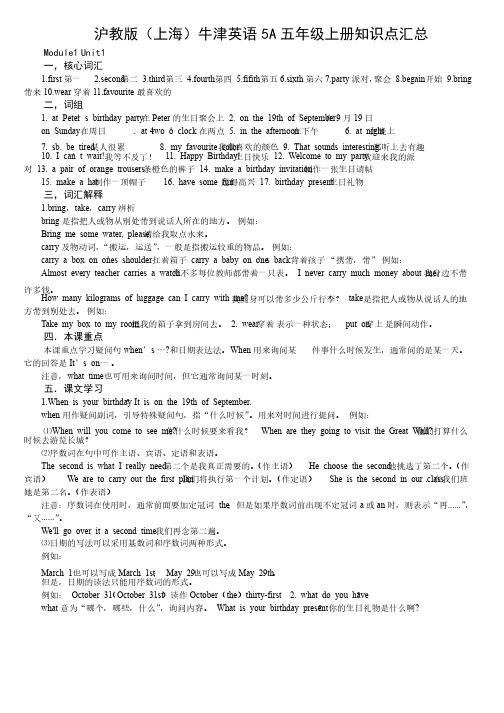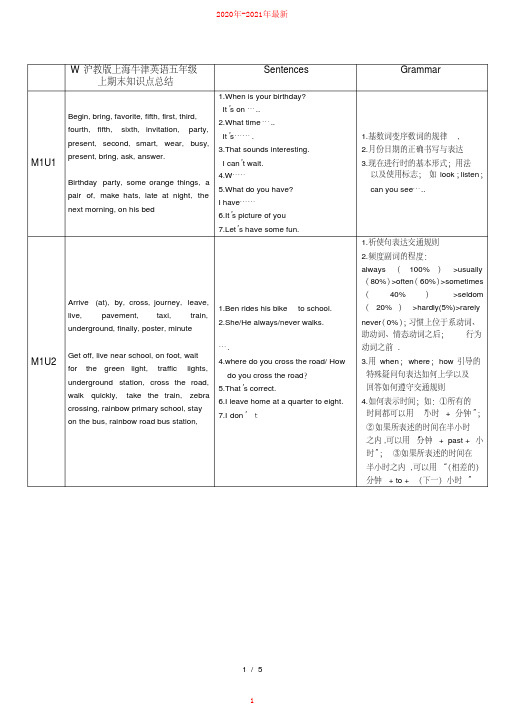沪教版上海牛津英语五年级上期末知识点总结(完美版)
(完整word版)沪教牛津英语五年级上册知识点归纳

M1U1 Can I do this?1. 用‘there’作为开头表示事实,例如:There’s the red man。
2。
用祈使句发指令。
例如:Cross! Go! Wait!3. 用祈使句的否定形式禁止他人做某事。
例如:Don’t Cross the road。
Don't smoke。
Don’t make a noise.4。
用名词表达事物。
例如:The traffic light’s red.5。
用情态动词can征求允许。
例如:Can I go out , Mum?6. 用Here you are回答问题。
(给你)7. 用现在进行时表达正在进行的事情。
例如:They are going out。
8。
用一般现在时态表达简单的事实。
例如:They are on the train。
9. 学习用which对定语提问。
例如:Which sign means ‘Don’t eat or drink’?(哪一个标志的意思是“禁止吃喝”)10. 用I’m sorry. 表达歉意。
11. 在否定句中用or代替and。
例如:Don’t eat or drink.M1U2 This is what I want1. 用What do you want ? 询问“你想要什么?”2. 用I want…表达要求。
例如:I want some paper.3. 学习用Here’s /Here are …表达“给你… …”。
4。
用Thank you very much.表达感谢。
5。
用形容词修饰东西。
例如:a large Coke (一大罐可乐)6。
用情态动词can征求许可。
例如:Can I have some fish,please?7。
学习关于菜的名称。
例如:noodles、vegetablesM1U3 This is what I need1。
关于学习用品的单词。
例如:books.2。
用’What do you need for school ?' 询问“你上学需要什么?"3。
沪教牛津英语五年级上册知识点归纳【2020年-2021年最新】

沪教牛津英语五年级上册知识点归纳作为开头表示事实;例如:There’s the red man.1. 用‘there’2. 用祈使句发指令.例如:Cross! Go! Wait!3. 用祈使句的否定形式禁止他人做某事.例如:Don’t Cross the road. Don’t smoke. Don’t make a noise.4. 用名词表达事物.例如:The traffic light’s red.5. 用情态动词can征求允许.例如:Can I go out , Mum?6. 用Here you are回答问题.(给你)7. 用现在进行时表达正在进行的事情.例如:They are going out.8. 用一般现在时态表达简单的事实.例如:They are on the train.9. 学习用which对定语提问.例如:Which sign means ‘Don’t eat or drink’?(哪一个标志的意思是“禁止吃喝”)10. 用I’m sorry. 表达歉意.11. 在否定句中用or代替and.例如:Don’t eat or drink.M1U2 This is what I want1. 用What do you want ? 询问“你想要什么?”2. 用I want…表达要求.例如:I want some paper.表达“给你……”.3. 学习用Here’s /Here are …4. 用Thank you very much.表达感谢.5. 用形容词修饰东西.例如:a large Coke (一大罐可乐)6. 用情态动词can征求许可.例如:Can I have some fish, please?7. 学习关于菜的名称.例如:noodles、vegetablesM1U3 This is what I need1. 关于学习用品的单词.例如:books.询问“你上学需要什么?”2. 用’What do you need for school ?’ 3. 用We need … 表达“我们需要……”.例如:We need some paints.4. 用一般现在时表达想法.例如:That smells good. (闻起来真不错)5. 用情态动词提出要求.例如:Can I have a bowl, please?6. 用We have got … 表达“我们有…”.例如:We’ve got some water.7. 用but表示转折.例如:Kitty has a uniform but it is small.8. 用现在进行时表达正在发生的事情.例如:They are looking at some uniforms.9. 用形容词进行修饰.例如:It is cheap but it is nice.M2U1 Me1. 用一般现在时表达习惯的行为.例如:This is the way I wash my face.(这就是我洗脸的方式)2. 在时间前用at表达.例如:at half past one in the afternoon (早中晚前用in the ;周几前用on.)3. 用what time询问事情发生的时间.例如:What time do you get up ?4. 用一般时态表达自己或者他人的作息安排.例如:I get up at six. Ben gets up at seven.(注意第三人称单数在一般时态中的变化.)M2U2 What do you like?1. 用Are you …? 询问“你…….?”及其回答Yes, I am.或No, I am not.2. 用祈使句发指令.例如:Clap your hands.(拍手)3. 用or连接的选择疑问句.例如:Is Kitty hungry or full?及其回答She is hungry.或She is full.ay on Saturday.(Kitty, 星期六是你生日)4. Kitty, it’s your birthd例如:Which bag does Kitty want? (Kitty想要哪个书包?)5. 用Which询问“哪个”.表达喜好.例如:I don’t like the black one but I like the green one.6. 用I like 或I don’t like …t.询问“Kitty喜欢…吗?”及其回答Yes, she does.或No, she doesn’7. 用Does Kitty like …?8. 用but表示转折.例如:I don’t like the green one but I like the yellow one.9. 指定某一特殊物体.例如:I want the pink one, please. (我想要粉红色的那个)10. 关于食物的名称.例如:cabbage, carrots, sausages11. 用What do you like?询问“你喜欢什么?”及其回答I like…“我喜欢……”;例如:I like rice.M2U3 A birthday party1. 日期的表达.例如:the fourth of February (二月4号)2. 用When’s your birthday?询问“你的生日是哪天?”3. 在日期前用介词on.例如:My birthday’s on the fourth of February.4. 用序数词表达:twenty-first (第二十一)5. 用Which … do you like? 询问“你喜欢哪个……?”及其回答I like that one.6. 用What are you doing? 询问“你正在干什么?”7. 用现在进行时表达正在发生的事情.例如:I’m making some cards. (我在制作卡片)8. 用Do you want … or …? 表示选择,意思为“你想要…还是…?”M3U1 My school例如:There are two floors.表达“有…”.1. 用There is /are…2. 用hundre d“百”的表达.例如:There are a hundred children in my school.3. 用how many 询问数量.例如:How many floors are there in your school?4. 用时间的表达(具体时间前面用at ).例如:At a quarter to/past twelve we have our lunch.5. 用一般现在时表示习惯的行为.例如:I eat my lunch at 7 o’clock in the morning..例如:I like Monday.表达“我喜欢…”.6. 用I like …7. 用现在进行时表达正在发生的事情.例如:I am painting a picture.8. 用一般现在时表达事实.例如:Eight children in our class go to school.9. 用How do you go to …?询问乘坐什么交通工具?回答:I go by tram.(其中步行用on foot = walk)M3U2 Let’s go shopping1. 用I want 表达“我想要……”.例如:I want a new ball.2. 用指示代词和冠词进行修饰.例如:I want a new umbrella. That one’s big.3. 用how much询问多少钱.例如:How much money have you got ?4. 表达钱币.例如:A¥50 note is green.例如:I’ve got eighty yuan.5. 用I have got 表达“我有……”.6. 用Which one?表达“哪一个?”7. 用形容词修饰物品.例如:The big blue one.8. 用Excuse me.表达“打扰一下”.9. 用What’s she buying?询问“她正在买什么?”及其回答She’s buying some bread.M3U3 Follow the signs!例如:Don’t jump into the pool.1. 用祈使句的否定形式表达“禁止……”.2. 用It’s dangerous. 表达危险.3. 用’Which one means … ?’表达“哪个表示……?”4. Eddie and Danny like football.例如:She has a dog..5. 用She has …表达“她有……”.6. 用现在进行时表达正在发生的事情.例如:A boy is riding his bicycle here.例如:You can’t ride a bicycle here.7. 用can’t 表达“禁止……”.8. 用祈使句发指令.例如:Look at this sign!9. 用Why not?询问理由.(为什么不?)10. 用适当的介词表示地点.例如:They are going to North Park by bus.M4U1 Wild animals1. 用一般现在时态表达事实.例如:Some monkeys live in the jungle.例如:It can swing on the rope.表达“不能、不会”.2. 用can表达“能;会”或can’t3. 用现在进行时表达正在发生的事情.例如:This one is eating a banana.4. 用Does it eat…?询问“它吃……吗?”及其回答Yes, it does.或No, it doesn’t.5. 用like 表达喜好.例如:I like monkeys.6. 用Can a giraffe…? 询问“长颈鹿能……吗?”及其回答Yes, it can. 或No, it can’t.7. 用Where 询问地点.例如:Where does it live?M4U2 Butterflies1. 用What’s that? How do you spell that in English?询问“那是什么?你用英语怎么拼?”2. 用形容词修饰.例如:It’s beautiful.3. 用I don’t know .表达“我不知道”.4. 用一般现在时表达事实.例如:It lays some eggs on a leaf.5. 用like 表达喜好.例如:I like butterflies.6. 用Which one do you like ?询问“你喜欢哪一个?”7. 用and连接并列关系.例如:I like the red and yellow one.8. 用but进行转折.例如:I like the…one but I don’t like the … one.M4U3 Parks and places in China1. 用一般现在时表达事实.例如:I don’t know this place.in Shanghai. It’s on Hainan Island.2. 用介词表达在某个地方.例如:It’s3. 表达地名和地方.例如:That’s the Li River.4. 用情态动词进行请求.例如:Can we see the dolphins?5. 用形容词进行修饰.例如:I’m hungry.6. 用一般将来时表达将要发生的事情.例如:Janet and Simon are going to Ocean Park.7. 用where询问地方.例如:Where are Janet and Simon going?例如:Who is the man?8. 用who 询问“谁”.例如:What is he doing?9. 用what询问“干什么”.。
5A 牛津沪教版五年级上M2U3知识点(附默写纸)

一. Words1. east 东2. south 南3. west 西4. north 北5. move 移动6. bedroom 卧室7. kitchen 厨房8. study 书房,学习9. face 朝着10. bathroom 浴室二. Phrases1. living room 客厅2. dining room 餐厅3. the Chens 姓陈的一家人4. be happy to do 做某事很开心5. be happy with …对…感到满意6. face south 朝南7. a lot of sunshine 许多阳光8. all day 整天三. Sentences1. Which room do you like ?你喜欢哪个房间?2. Why do you like it?你为什么喜欢它?3. I know why. 我知道为什么。
4. Because the living room faces south. 因为客厅朝南。
5. Do you like Mary’s home or Jhon’s home?你喜欢玛丽的家还是简的家?一. Words1. 东________________2. 南________________3. 西________________4. 北________________5. 移动________________6. 卧室________________7. 厨房________________ 8. 书房,学习________________9. 朝着________________ 10. 浴室________________二. Phrases1. 客厅_________________________________2. 餐厅_________________________________3. 姓陈的一家人_________________________________4. 做某事很开心_________________________________5. 对…感到满意_________________________________6. 朝南_________________________________7. 许多阳光_________________________________8. 整天_________________________________三. Sentences1. 你喜欢哪个房间?________________________________________________2. 你为什么喜欢它?________________________________________________3. 我知道为什么。
沪教牛津版五年级英语上册全册知识点汇总

沪教牛津版五年级英语上册全册知识点汇总Module 1 Getting to know each other一、核心词汇1.名词:future 将来;未来pilot 飞行员job 工作;职业singer 歌手lifeguard 救生员Ms 女士journey 旅程;旅行underground 地铁station 车站hour 小时party 聚会thing 东西;事物hat 帽子2.动词:want 想要teach 教(课) fall 掉落;落下save 救;救助;节约become 变成;变得walk 走;步行take 乘坐(交通工具);带领begin 开始bring 带来3.形容词:favorite 最喜欢的interesting 有趣的4.介词:by(表示方式);靠近after 在……后5.副词:when 什么时候6.兼类词:cook 厨师;烹饪7.短语:taxi driver 出租车司机(be) good at 擅长primary school 小学bus stop 公共汽车站by bus 乘公共汽车far from 离……远on foot 步行by bike 骑自行车by car 乘小汽车get off 下车have fun 尽情玩二、拓展词汇1.名词:doctor 医生teacher 老师sky 天空subject 科目2.月份名词:January (Jan.) 一月February(Feb.) 二月March(Mar.) 三月April(Apr.) 四月May 五月June(Jun.) 六月July(Jul.) 七月August(Aug.) 八月September(Sept.) 九月October(Oct.) 十月November(Nov.) 十一月December(Dec.) 十二月3.动词:help 帮助4.短语:fly a plane 驾驶飞机be afraid of 害怕三、核心句型1.—What do you want to be? 你想要成为什么?—I want to be a pilot. 我想要成为一名飞行员。
5A 牛津沪教版五年级上M4U2知识点(附默写纸)

M4U2第一课时背诵内容一. Words1. gently adv. 温柔地,轻柔地2. strongly adv. 猛烈地3. slowly adv. 缓慢地4. quickly adv. 快速地5. softly adv. 柔和地6. blow v. 吹7. windmill n. 风车8. move v. 移动二. Phrases1. blow gently 轻轻地吹2. dance in the wind softly 在风里轻柔地舞动着3. move slowly/quickly 缓慢地/快速地转动4. fly their kites happily 开心地放风筝5. go out 出去6. look out of …向外看去7. rain heavily 雨下得很大8. watch the weather on TV 在电视上观看天气预报9. a heavy rain 一场大雨10. a strong wind 一阵大风11. a rainy day 一个下雨天三. Sentences1. There is no wind. = There isn’t any wind. 那里没有一点风。
2. The children swim happily in the sea. 孩子们在海里开心地游泳。
3. The wind is blowing gently/strongly. 风轻轻地/猛烈地刮着。
4. The windmill is moving slowly/quickly. 风车慢慢地/快速地转着。
5. The children are flying kites happily in the park.孩子们在公园里开心地放风筝。
M4U2第一课时背诵内容一. Words1. 温柔地,轻柔地___________________2. 猛烈地___________________3. 缓慢地___________________4. 快速地___________________5. 柔和地___________________6. 吹___________________7. 风车 ___________________ 8. 移动___________________二. Phrases1. 轻轻地吹____________________________________2. 在风里轻柔地舞动着____________________________________3. 缓慢地/快速地转动____________________________________4. 开心地放风筝____________________________________5. 出去____________________________________6. 向外看去____________________________________7. 雨下得很大____________________________________8. 在电视上观看天气预报____________________________________9. 一场大雨____________________________________10. 一阵大风____________________________________11. 一个下雨天____________________________________三. Sentences1. 那里没有一点风。
沪教版(上海)牛津英语5A五年级上册知识点汇总

沪教版(上海)牛津英语5A五年级上册知识点汇总Module1Unit1一,核心词汇1.first第一 2.second第二第二 3.third第三 4.fourth 第四第四 5.fifith第五6.sixth第六7.party派对,聚会 8.begain开始 9.bring 带来10.wear穿着11.favourite最喜欢的二,词组1. at Peter’s birthday party在Peter的生日聚会上 2. on the 19th of September在9月19日on Sunday在周日 4在晚上.at two o’clock在两点 5. in the afternoon在下午 6. at night7. sb. be tired某人很累某人很累 8. my favourite color我最喜欢的颜色 9. That sounds interesting.那听上去有趣10. I can’t wait! 我等不及了!欢迎来我的派我等不及了! 11. Happy Birthday! 生日快乐 12. Welcome to my party. 一条橙色的裤子 14. make a birthday invitation制作一张生日请帖对 13. a pair of orange trousers15. make a hat制作一顶帽子 16. have some fun过得高兴 17. birthday present生日礼物三,词汇解释1.bring,take,carry辨析bring是指把人或物从别处带到说话人所在的地方。
例如:Bring me some water, please.请给我取点水来。
carry及物动词,“搬运,运送”,一般是指搬运较重的物品。
例如:carry a box on one’s shoulder扛着箱子 carry a baby on one’s back背着孩子“携带,带”例如:Almost every teacher carries a watch.我身边不带差不多每位教师都带着一只表。
沪教牛津五年级英语上册牛津英语五年级上册知识点整理

沪教牛津五年级英语上册复习内容模块纵览Module1 Getting to know each other本模块是关于认识自己及了解他人。
Unit1 My future介绍了各种职业,探讨未来想从事的职业。
Unit2 Going to school介绍了上学或上班的出行方式。
Unit3 My birthday介绍了有关生日的庆祝活动。
Module 2 Relationships本模块是关于自己与家长及朋友的关系。
Unit4 Grandparents介绍了和祖父母一起进行的活动。
Unit 5 Friends介绍了自己和好朋友之间的相同和不同之处。
Unit 6 Family life介绍了不同的房间及家庭生活。
Module 3 Out and about本模块是关于丰富多彩的户外生活。
Unit 7 At the beach介绍了海边休闲度假时所做的一些事情。
Unit 8 An outing描述了一次“寻宝”活动。
Unit 9 Around the city是关于问路及指路。
Module 4 The natural world本模块是关于大自然和人们日常生活之间的关系。
Unit 10 Wind认识风的各种状态。
Unit 11 Water介绍了水的各种用途。
Unit 12 Fire介绍了一些基本的防火知识。
第一单元复习1.词组Jump into the lakefly a planecook nice food(be) afraid of flyinghelp peopledrive a taxi(be)good at...2.句型用What do you want to be ?询问对方将来想从事的职业。
用I want to be ...及I want to(do)...介绍自己未来想从事的职业及理由。
3.难点1)当句子主语为第三人称单数时,动词要做适当的变化。
2)want to do与want to be的正确用法。
沪教版上海牛津英语五年级上期末知识点总结【2020年-2021年最新】

…. 4.where do you cross the road/ How
do you cross the road? 5.That’s correct. 6.I leave home at a quarter to eight. 7.I don ’t
Grammar
1.基数词变序数词的规律 , 2.月份日期的正确书写与表达 3.现在进行时的基本形式;用法
2/5
2
2020年-2021年最新
A lot of, be farm from, be happy with, have a new home, face south, all day, twice every year, fly to the north, live in the south, enough food, in the north, fly back, get up early, work late
2.what do you do with them? I often play chess with my grand. 3.who’s there? 4.Your grandchild .Little Red
1.多久一次 how often 的用法 2.表达频率的词组;如次数超过 两次时用基数词加次数( times) 组成; once; twice 特殊记
How about you? 9.I have a good friend called
Brett.
10. She’s happy like a bee
Change, east, enough, face, miss, share,move, north,, south,study, sunshine, take, team, through, twice, west, wild goose, lovely,
- 1、下载文档前请自行甄别文档内容的完整性,平台不提供额外的编辑、内容补充、找答案等附加服务。
- 2、"仅部分预览"的文档,不可在线预览部分如存在完整性等问题,可反馈申请退款(可完整预览的文档不适用该条件!)。
- 3、如文档侵犯您的权益,请联系客服反馈,我们会尽快为您处理(人工客服工作时间:9:00-18:30)。
2.名词加数词的用法;名词加基 数词; Room 5 或者序数词加名 词 the Fifth Room
different, teams, the fifteen floor, play with 8.I like running and football.
all you, many kinds of pet, sit under the tree, look at them for hours
easy, ( the) Internet, once, talk, weekend Double Ninth cake, go on an outing, go shopping, have a cold, Little Red Riding Hood, play chess, write an e-mail, ask sb. about, once a week, twice a year, do the
golden, hero, win, pretty, congratulations, 4. It is a different, match for 1.both 和 all 的用法区别; both
pet, spider, vet, rat, snake
both teams.
指两者都; all 指三者或以上 .
How about you? 9.I have a good friend called
Brett.
10. She’s happy like a bee
Change, east, enough, face, miss, share,move, north,, south,study, sunshine, take, team, through, twice, west, wild goose, lovely,
1. Why do you like it? Because it’s quiet. 2. Which room do you like? I like the living room.
1.由 why 引 导 的 问 句 及 回 答 because 2.问哪个东西用 which ;并且后 面直接跟名词;
2.what do you do with them? I often play chess with my grand. 3.who’s there? 4.Your grandchild .Little Red
1.多久一次 how often 的用法 2.表达频率的词组;如次数超过 两次时用基数词加次数( times) 组成; once; twice 特殊记
以及使用标志; 如 look ;listen; can you see…..
1.祈使句表达交通规则
2.频度副词的程度:
always ( 100% ) >usually ( 80%)>often( 60%)>sometimes
(
40%
)
>seldom
( 20% ) >hardly(5%)>rarely
4.W…… 5.What do you have? I have…… 6.It’s picture of you
7.Let’s have some fun.
Arrive (at), by, cross, journey, leave, live, pavement, taxi, train, underground, finally, poster, minute
housework, on one ’s way to, run away, climb Riding Hood.
3.What 引导的感叹句;与 how
mountains, live with, on the Internet, go to 5.Grandma,what strong arms 引导的感叹句的对比
My job is … ../I am a/an ….. 5.He wants to fly a aeroplane, but he is afraid of flying. 6.He wants to be a star. But he is not good at singing.
1.运用 want to do 询问别人梦想 工作及回答; want to do/want sth. 2.询问别人工作及回答; what’s your job/what do you do? 3.like 用法 , 如 ; ① like+sb./sth. 喜“欢某人 / 某 物 ”; ② like to do(sth)/like doing sth.“喜欢做(某事) ”; ③ like sb.to do (sth) 想“要某人做(某 事 ) ”; ④ like 作 介 词 , 意 为 “像 ……”,在句中一般作状语或 表语 .
In the same, cross the street, each other, a 5.We don’t have any water. football match, members of the school’s 6.Don’t worry football club, after school, the half time, in 7.I am Tony from Room 506
时 ”; ③如果所表述的时间在
半小时之内 ,可以用 “(相差的)
分钟 + to + (下一)小时 ”
1/5
M1U3 M2U1 M2U2 M2U3
Worker, pilot, farmer, cook, shop assistant, survey, question, traveler, froggyy ,save, lifeguard, brave, dream, fly, help, sell, writer Be good at, in the future, fly an air aeroplane, work at home, help sick people, cook nice food, in the street, dream job, travel around the world, be afraid of doing, hear a cry, in the lake, jump into
1.Ben rides his bike to school. 2.She/He always/never walks.
M1U2
Get off, live near school, on foot, wait for the green light, traffic lights, underground station, cross the road, walk quickly, take the train, zebra crossing, rainbow primary school, stay on the bus, rainbow road bus station,
Words and expressions
Sentences
Grammar
Grandparents, wolf, grandchild, strange, hug, 1.w often do you visit them?
hunter, traditional, wear, laugh, flat, fun, I visit them once a week.
It ’s on … .. 2.What time … ..
It ’s…… . 3.That sounds interesting.
I can’t wait.
Birthday party, some orange things, a pair of, make hats, late at night, the next morning, on his bed
3.There be 的就近原则
3/5
M3U1 M3U2 M3U3
Words and expressions
Sentences
Grammar
Along, bakery, bank, cinema, crocodile, 1. Excuse me, how do I get to the
crossing, hospital, hotel, lane, museum, right, shark, turn, meet, afraid, dolphin, hungry, dark, soft, giraffe, naughty, laugh, favorite, strong Walk along Green Road, turn left/right, at the first crossing, cross park street, an underground station, nest to, take the underground, at Brown Street Station, get off at Sea Street Station, on park road, at the zoo, want to see different animals, look at a map of the zoo, on our right/left, a visit to Ocean
3. Where are Peter and Paul? They are in the garden. 4. How many bedrooms are there? There are three bedrooms 5. How ’s your new room, Peter? It ’s very nice. 6. The sunshine through the window in the morning 7. It only take 20 minutes by bus
